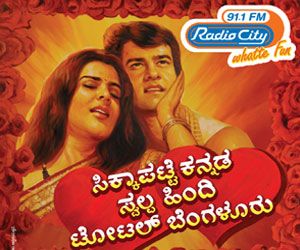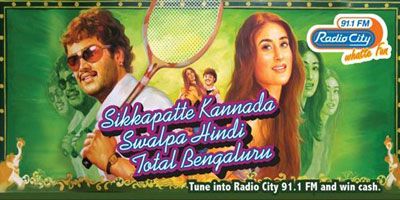

The country's first private FM station launched in the garden city almost six years ago. Several other players followed, and in the radio space, Bangalore has turned out to be one city that never let complacency get the better of it.
The trend continues, with many stations having executed an about turn in their programming in the last few months in Bangalore, in terms of format, content and jock talk.
Radio Mirchi, Big FM, Radio One, Indigo, Fever, Sun (Suryan), AIR's Rainbow are the other players in the Bangalore airspace.
Most stations claim that they have changed the content or the jock talk format, or have even re-defined their positioning to cater to the listener, to attract more listeners. Those who have changed claim that they have based their decisions using TAM's Radio Audience Measurement data or/as well as
research done either internally or with the help of an outside agency.
Says Fever's Bangalore station head Anjali Paul, "While Bangalore is a melting pot of varied cultures, there has been a resurgence of Kannada culture and ethos in the city - Kannada movies, songs, film stars are all quite a rage amongst the youth these days! And, radio being a local medium, the objective is to cater to the majority of what our target group wants and prefers. On our station, listeners can look forward to the best of Kannada and Hindi music packaged in Fever 104's unique and innovative style with lots of fun and interactivity. We will also be rolling out some compelling listener-oriented programs soon." Fever Bangalore recently announced a change in format with the inclusion of Kannada talk and music as a strategic decision.Radio City changed its format early this year. From a predominantly Bolllywood content, English led station, it changed its jock talk to a mix of Bollywood and Kannada music with a tilt towards the latter. This week, it announced that it had changed its format once again - now it the content is 80 per cent Kannada.
A new term has been coined to define the language that jocks on some Bangalore stations speak- 'Kanglish' (a mix of English and Kannada with a token word of Hindi sometimes.) Kanglish, claim the stations, is supposed to be the lingo of the average Bangalorean.
What is a Bangalorean?
Though Kannada is still the most widely spoken language among (though not a simple majority) those used in the IT capital of the country, between 60 to 65 per cent of the city's population is non-Kannadiga. People from Andhra Pradesh (who speak Telugu) and Tamil Nadu (who speak Tamil) form a significant chunk of the population, as well as people from all parts of the country.
Among all the Bangalore stations, three -Big FM, Indigo and Radio One have stuck to their original stated positioning and formats.
Big FM came to Bangalore announcing itself as a predominantly Kannada content station with Kannada jock talk mixed with a bit of Bollywood content. The station has stuck to its formula of 80 per cent Kannada and 20 per cent Bollywood content.
Big FM's Senior VP and CTO Soumen Ghosh Choudhury says, "Since radio is a medium of local connect, we have researched the consumption pattern of our listeners in each of the markets. We have then skewed our content to be aligned to it. So currently depending on one market to another we could vary to a large extent basis consumer demand. For example, we are 100 per cent Tamil in Chennai but have an 80 per cent skew towards Kannada in Bangalore with 20 pecent Hindi music. This strategy has worked wonders for us and the RAM figures are proof enough."
Indigo announced itself as an international music station with English jock talk and has stuck to this format and positioning and has even replicated the same at the only other place where it operates in India from - Goa. In Goa, Indigo did have to change its content format. Earlier, the format had a slight tilt towards Gospel music, now it is the same in both the cities, says Asianet's Sanjay Prabhu.
Radio One Bangalore's station head Shyju Varkey avers, "We're a 100 per cent Bollywood station, discounting an hour of international music post midnight on weekdays. We don't use a formula as such for our jock talk. Our RJs go with the flow, depending on the vibe they get from listeners and those who call in. Almost all our jocks are tri-lingual, and shift quite effortlessly between Kannada, English and Hindi."
Radio Mirchi Bnagalore was among the first of the changers that has successfully positioned itself as a totally Kannada station with 100 percent Kannada content and jock talk. Industry sources attribute Mirchi's success to timing, the change in Kannada music and the Times group's marketing skills. "Mirchi changed its format around the time when the average Kannadiga was starting to have pride in being a Kannadiga, started believing in himself and this was also around the period Dr Rajkumar passed away. Also, Kannada cinema music had started becoming more melodious, from the earlier very macho to melody. Movies such as Munguru Malle were very successful because of the music, the storyline was good, but the music contributed in a big way to its success," say sources.
Syndicated ad deals and good marketing have contributed to the success of the format, add sources.
Among the recent entrants, Sun which laid claim to being the true totally Kannada radio station has started introducing some Bollywood content. But while Big FM caters to a slightly more sophisticated Kannada listener, Mirchi's content and lingo are focused on the mass Kannada listener.
How do the RJs' take the change in a station's positioning and/or content?
Some RJs Radioandmusic.com spoke to say they didn't have a choice in the matter. Running a station was a business, and whatever needed to be done to make it profitable had to be done.
Do advertisers prefer the shift of radio stations to regional languages?
Says a Bangalore based media person who did not wish to be quoted, "It's both. For example, if you are looking at masses / reach then regional languages will definitely have more listeners; but, if your brand is Wrangler which associates itself with English rock music - then it will never do a thematic campaign on radio mass channels; it however may consider them on Wrangler off season sale which is a tactical/promotionaloffer campaign."
Is this trend prevalent all over India/South India? Says the planner, "Such a trend is seen in cosmopolitan cities where it is due to the local population being less than 50 per cent (as in the case of Bangalore); Most of the stations do have 20-30 per cent of other language music generally.
Most of the Kerala stations air Tamil songs also as they are very popular there."